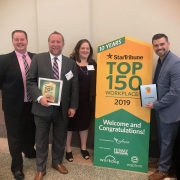When associates are required to use mobile aerial work platforms, forklifts, or pallet jacks, it is essential to ensure they are operating them as safely as possible. This article will address the primary forms of lift equipment used by our associates and serves to remind us all of the importance of being aware of our surroundings to ensure that everyone remains safe and accident-free.
Lifts-
Lifts are designed to elevate personnel on a platform supported by scissors, masts or booms. Work platforms are essential when technicians must perform work for extended periods at elevations where a guarded, fixed work surface is not available. They offer flexible, versatile access to elevated locations and tend to be safer than ladders and other access equipment when working at higher elevations. But for these essential pieces of equipment to be as safe and efficient as possible, users must operate and maintain them according to regulations and manufacturer requirements.
Common safety violations leading to citations or accidents include:
• lack of fall protection
• tip-overs
• working near live power
• crushing and pinch-points
• objects falling from platforms
• unstable surfaces.
The leading causes of these problems include a lack of training, misuse of equipment, and not following manufacturer guidelines. According to the U.S. Bureau of Labor’s fatality statistics, 75 percent of scissor lifts that tipped over resulted in fall deaths. In the remaining accidents, workers died from being struck by the falling scissor lift. About 40 percent of the tip-overs occurred when an operator extended the scissor lift higher than 15 feet, mostly while driving the unit. In 20 percent of the falls, the worker was ejected from the scissor lift, generally when the lift hit another object. Other fall deaths occurred after operators removed chains or guardrails or while users stood on or leaned over railings. (U.S. Bureau of Labor, 2015)
Forklift Safety-
Approximately 100 workers are killed each year as a result of forklift accidents. About 1/4 of these fatalities are caused by forklifts overturning. Other common causes are workers being struck by materials, workers being struck by the forklift, and workers falling from the forklift.
12 Forklift Safety Rules-
1. Only allow certified employees to operate forklifts
2. Maintain a safe following distance from other forklifts – about three vehicle lengths.
3. Follow speed limit and other regulations
4. Drive with load low – six or eight inches off the ground – and tilted slightly back
5. Exercise extra caution when driving over duckboards and bridge plates and make sure the load is within the forklift’s capacity as well
6. Raise and lower the load only when stopped
7. Stop and sound the horn at intersections
8. Avoid sharp turns.
9. Keep arms and legs inside the vehicle
10. Be sure to wear a hard hat and other protective equipment when necessary
11. Be sure the load is stable and secure
12. When leaving the forklift, lower the forks, neutralize the controls, shut it off and set the brakes (NCSU, 2015)
Pallet Jack Safety-
Often employers do not require certification for non-motorized pallet jacks because initially this equipment is not seen as a hazard, but they still can cause damage to employees and bystanders. Pallet jacks are used to make easy work out of what would usually be multiple person jobs lifting a load from point A to B eliminating the strain and energy while also saving time.
When operating a pallet jack (even for a short time span) workers should wear the correct safety equipment including steel capped boots, gloves, and safety eyewear (when transporting dangerous chemicals). There are also some safety precautions workers need to keep in mind when operating a pallet jack which includes:
• Never place feet under a machine
• Never exceed the advised capacity
• Use proper lifting techniques when loading/unloading and operating the pallet jack
• Move the load slowly to ensure safety in case surroundings change
• Always push the load (never pull the load)
• When going down on an incline, go in reverse
• Be wary of pinch points to avoid hand injuries
• Ensure the pallet jack is in excellent condition before use
• Use it correctly to ensure employee’s safety and the safety of the people in the surrounding area.
(U.S. Bureau of Labor, 2015)
Secure Work Areas-
Lift operators must be aware of activities taking place near their lift work areas. It is essential to keep the public, employees, and other building occupants away from these areas. They also should be careful when using lifts in public-traffic areas, especially where doorways might swing into the equipment, or nearby elevators might open. Isolating the immediate work area is essential to prevent anything from bumping into the lift, and to minimize worries about objects falling from the lift and hitting someone.
As the lift is elevating, the operator and employees on the ground should make sure appropriate clearance exists, so overhangs or other protrusions do not cross the path of the moving platform. This precaution will prevent injuries to workers and damage to building components. (OSHA, 2015)
In Conclusion-
Being mindful of the above information, ensuring that all associates receive the proper lift equipment training and re-training, and constantly reminding everyone to work safely, will help to reduce workplace incidents, control Workers’ Compensation costs, and ensure that our associates are as safe as possible.
Need some help? Contact Award Staffing. We will be able to match you up with interviews in your area so you can get the job opportunity you want. We have offices located in Bloomington, Chaska, Crystal, Delano, Maplewood, and Ramsey Minnesota to help you with your job search today!



